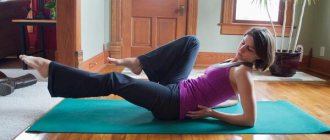Living here and now means the ability to turn off thoughts about the past and future, transferring the focus to the present moment. In this state, anxiety disappears and confidence appears, a feeling of harmony and happiness arises, and answers to all questions are found.
In this article, I will not only offer you one of the easiest ways to be here and now, but also show with examples what results you can get in the first week of training.
Important! Click on the link and learn 5 secrets of fulfilling any desire from Elizaveta Volkova >>>
Live here and now or live one day: what's the difference?
Sometimes the principle of “here and now” is taken literally: live for today, and tomorrow there will be a flood. This is not true. Conscious presence in every moment of your life is more like the detachment of an observer who sees the whole picture. Yes, the past no longer exists, and the future has not yet arrived. But this does not prevent the observer from analyzing yesterday’s experience and planning his “tomorrow”.
However, if you have at least once tried any of the practices of being present here and now, you have already realized that this is not at all like the habit of living one day at a time.
Stopping attention in the moment “here and now” is the first step to developing awareness. The sensations that you experience cannot be confused with anything: they are often described as a feeling of freedom and happiness, wholeness and fullness of life, reunification with the inner “I”.
Each spiritual teacher explains this state in his own way, since awareness is easier to feel than to convey in words.
In you, as in other human beings, there is a dimension of consciousness that is immeasurably deeper than thinking. It is the very essence of who you are. We can call it presence, awareness, unconditional consciousness.
Eckhart Tolle "What Silence Says"
Self-remembering is inconspicuous. The Higher Self perceives both itself and the observed objects at the same time.
Robert Burton "Self-Remembering"
Watch every action you take. Observe every thought that passes through your mind. Observe every desire that comes over you.
Osho “Mindfulness. The key to life is balance"
What trains, develops - the more you practice mindfulness, training the ability to live here and now, the longer you manage to stay in this state.
Let's get down to the simple steps you can take to get started today.
On the subject: TOP 100 books about the power of thought
loss of a loved one
the experience of grief is a separate section of psychology that tells about all the stages that a person goes through when faced with a bereavement. Sometimes only a good specialist can help him. Well, those of us who are trying to cope on our own may just use escapism as the only way to fill the huge feeling of emptiness. In this case, instead of systematically reducing the level of emotional stress and getting used to life “after”, a fixation on one of the stages may occur. Then a person can remain at the “level of denial” for years and live as if he is still in the past and the terrible loss has not occurred, or even pretend that he is not at all affected by the absence of a loved one, filling his life with plans for the future that leave no room thoughts about the present;
A simple technique “here and now”: read and try it right away!
Practice this technique in a relaxed state, otherwise you won’t be able to be here and now. If you're stressed, try to switch your thoughts to something else. Listen to music, remember a funny joke, take a few slow breaths.
Stage 1. Naming objects
Let your eyes wander and mentally name all the objects you see. This will force your attention to remain here and now, without mentally slipping into the past, but also without running into the future. If you see many identical objects, you can add color to the names. For example, blue car, white car, yellow leaf, green leaf. But it is important not to give them subjective assessments (old, fresh, tall, small, and so on).
Simply record what you see as dispassionately and objectively as possible. Evaluation refers to the past or future, but it is important for us to be here and now.
When this stage starts to work out well, move on to the next one (or do both at the same time).
Stage 2. Feeling yourself in the world around you
Remember yourself - “Here I am, I’m alive!” - and the rest of the world exists separately. Observe the sensations coming from all senses. Here and now, notice the touch of clothing, wind and rain on your skin. Here and now hear the singing of birds, the rustling of leaves, the sounds of the city. Feel the tastes, smells and temperature here and now. Observe the world around you as an alien arriving on Earth for the first time.
A life hack about an alien
is my favorite childhood pastime. I combine it with the practice of mindfulness : this makes it easier to separate flies from cutlets, and the outer world from the inner. Just imagine that you are from Mars, Venus or the Tau Ceti system. You are inside the spacesuit - in your body. Everything outside is a completely separate alien world from you. It’s especially nice to imagine yourself in such a spacesuit here and now , when it’s rain, wind and dirt outside.
This is roughly how newly born children behave when they look at their fingers, remember? Speaking of children...
Mindfulness is familiar to everyone. We just forgot how to do it.
My very first memory dates back to the age at which children do not yet know how to walk - until they are about a year old. I'm in a nursery, lying in a crib with bars and watching two nannies in white coats. Now I barely remember what they talked about, but it’s not that important. And it is important that at that moment I was in a state of awareness, clearly and impartially recording events. I realized this many years later, when I began to learn to be here and now. It turns out that we really can do all this, we just need to remember.
Stage 3. Turning off internal dialogue in the “here and now” state
Some time after completing the first two stages, you will have a feeling of emptiness and such freshness in your head, as if it had been ventilated. Well, or just an unusual condition. This is a signal that you are doing everything right on the path to awareness. In this case, the internal dialogue will turn off by itself (it may not work the first time - be prepared).
By the way, don’t try to do anything with extraneous thoughts. It is useless to fight them, and trying to observe them, as many spiritual mentors recommend, is not so easy.
Thinking cannot be stopped - not that it does not stop, but it cannot be stopped. It stops on its own. This difference needs to be understood; otherwise you may go crazy chasing your own mind.
Osho “Mindfulness. The key to life is balance"
On topic: Osho. Courage: the joy of living at risk
Don't pay too much attention to your thoughts, and they will actually begin to disappear on their own over time, once you become more familiar with the practice of “being here and now.”
At first, you may find it difficult to maintain a state of mindfulness for a long time. Don’t worry if during your first attempts you will be “knocked out” into normal life within a minute. Set yourself a goal: gradually increase the frequency and duration of sessions.
Set an alarm on your phone for 4 times a day (or more) to help you remember to practice and track your results.
Get free instructions on how to make your wishes come true while access is open >>>
And one more life hack, this time from Robert Burton:
Paradoxically, one of the best ways to prolong self-remembering is to not try to hold onto it. When unusual productive states arise, try to evoke within yourself a working self that says, “So be it.”
Successful future
American psychologist Welter Michel conducted a study in which several dozen children participated. He handed out marshmallows to the children and told them they could eat them right away or wait until he returned and get twice as many treats. Over time (the study was conducted in the last century), it turned out that children who waited for the psychologist to return became much more successful than those who chose to eat marshmallows right away. This suggests that you should never forget that tomorrow will come. A person who loves life and sees himself as successful in it will never live for today. He will plan, calculate and think not only about what he can do with his life, but also about what he will leave behind.
What happens if you exercise four times a day?
The topic of mindfulness is being actively discussed online, and I recently came across this question:
– How do I understand if I’m really
here and now , or if it just seems to me?
It is very easy to determine this if you have criteria - what results to expect from this method and when.
Try regularly practicing the suggested “here and now” technique, just four times a day. Within the first week you will discover something like this (perhaps in this order):
- Stress levels will decrease
This exercise once pulled me out of a severe depression in just one set. Those who have experienced depression will appreciate how great it works.
- More energy
There are many options to recharge your energy, but it is the mindfulness mindset that I use most often, because this method is simple and accessible. And, as a bonus, your mood rises and a feeling of happiness comes.
- You will become clearer about what you want from life.
Being in the “here and now” moment, you may find that your previous goals no longer warm you, and the focus of attention has shifted to something else. This is exactly what happened to me, by the way. Thousands of people attend trainings and buy books to understand their purpose. And you just need to look inside yourself - into your spacesuit...
- Glimpses of intuition will appear
For example, as soon as you think about a certain person, suddenly he calls or accidentally meets on your way. Don't treat this as a coincidence. This is exactly how the first steps towards great changes begin!
Living here and now is much more interesting. If you use public transport, you will soon start “ordering” the bus you need. If you have a car, a space will be freed up right before your arrival, even in a densely occupied parking lot.
On topic: Mindfulness is the key to living in balance
Vladislav Yu. (Pavlodar → Novosibirsk):
“There was only an understanding that someone skillfully turned peaceful rallies into a coup attempt. As soon as the occasion arises, everything comes out into the light.
I didn’t really follow the events, because I didn’t influence it in any way, and there was some kind of confidence that everything would get better in a week.
Such a terrible tragedy, in my opinion, can happen in any country, as the events in Ukraine and Belarus showed us. Here, by the way, there will be a phrase: “It’s good where we are not.”
Kazakhstan is one of the fastest growing countries in the post-Soviet space, and I am confident that with skillful leadership it can become one of the 30 leading economies in the world.”
How Mindfulness Attunement Works
It's simple: when we stop worrying about the events of the past and worrying about the future, the stressful state disappears by itself, like the morning fog. It just doesn't have the fuel anymore.
When we are here and now, the mental mixer in our head turns off and a huge amount of energy is released. This energy does not disappear into emptiness: you feel it as cheerfulness, a thirst for activity and a good mood.
When we immerse ourselves in contemplation, even more amazing things happen:
If you just sit and observe...over time your intuition blossoms and you begin to see things more clearly and be more in the present. Your mind just slows down and suddenly you see a huge space. You see a lot more than before.
Steve Jobs
A state of awareness, presence here and now, turning off internal dialogue - all this is the same proven way to open the door to your Subconscious. Of course, this area is in many ways still Terra incognita, but we can use some properties of the subconscious today.
Make friends with your feelings
Whatever feelings you have, try to deal with them openly and kindly. Don't forget that even the most painful emotions - fatigue, fear, frustration, sadness, feelings of loss or guilt - need to be treated kindly.
Photo: Depositphotos
When we replay a situation in our heads, the brain reacts to it as a real threat. When we remember the past or think about the future, it is not real, but imaginary difficulties that arise in our minds. As a result, we shut down our ability to think openly, creatively, and we either feel trapped and cowered, or our body prepares to fight-or-flight.
What our Subconscious can do
Imagine a car with a driver at the wheel and a navigator that says in the voice of Fyodor Bondarchuk: “There are road works ahead in the left lane” or “You have gone off route, this is not according to the script.” So, if you compare your body to a car, then your mind (or your consciousness) is the driver who sits behind the wheel. And your Subconscious can be considered a navigator, which sees all the paths and knows how to achieve the goal.
If you know how to live here and now, then the Subconscious will always tell you the right route and help you reach the Universe.
On the subject: How the subconscious controls your life
Take advantage of opportunities
“Some lack the inconstancy to live as they wish,” wrote Seneca. It's easy to get stuck in the mundane, feel terrible about a couple of bad days, live in daily dreams instead of reality.
Life is too short not to change, not to try, not to take risks. It's also too short to do things in ways that no longer work.
If you want to change your life, you have to take action and change something. To travel, you may have to sell something and hit the road. If you want to open a business, you will have to quit your job.
Not in the future, not when someone else takes care of all the details, but now .
How does the “here and now” state manifest itself? Examples from life
I promised to share personal examples of what the first results of the practice of being present here and now can be. Here they are.
Story No. 1. Reading information from outside
I mind my own business and don’t bother anyone. Suddenly, a first and last name - completely unfamiliar - come to mind from somewhere. A couple of hours later I find myself next to the TV and the “News” sadly reports that an actor with the same name and surname has died. I had seen the actor somewhere before, but I didn’t know his name.
This incident struck me greatly, which is why I remember it. In general, when you begin to be here and now, answers to questions that currently haunt you come in a similar way. They just appear in your head, literally out of nowhere, and that’s it. Watch this.
Story No. 2. Sharpening intuition
I'm in the supermarket, looking for a bag of nuts. There are all kinds of snacks on the shelves, but mine are gone, they're all gone. And I desperately need these nuts, right here and now. And suddenly a certain state, previously unknown to me, covers me, and my hand somehow, by itself, with a precise movement, reaches deep into the shelf, pushes the bags apart and pulls out the penultimate one.
Have you guessed it yet? These were the same nuts. And they were the only ones on the shelf, I checked - they got stuck in there by accident. My mind couldn't know about it. But intuition knew.
Story No. 3. Fulfillment of desires
My wish was a luxurious manicure. I usually make an appointment with my favorite master in advance. But then the family budget was so tight that there was no money left for a manicure. “Next time...” I thought. "Here and now!" - decided the Universe. And I instantly receive an offer to do a manicure four times cheaper than usual, because the master needs a model to practice a new technique.
This is how wishes gradually begin to come true. At first modest, everyday ones. Then - be bolder.
So what is next…
What will happen to you next?
If you practice the ability to be here and now every day, then over time, moments of awareness will begin to arise spontaneously and more often. You no longer need to play the game “name the object”: the sensations will become stronger and more beautiful without it.
Subsequently, you will learn to enter the presence mode here and now literally on the go and even during a conversation. Imagine, you were called to a showdown with your superiors, and you are calm, like Buddha. You watch the whole conversation from the side, like Fyodor Bondarchuk in a navigator - there’s an accident, and there’s a traffic jam, we’ll go around here. And it’s no longer the boss who controls the script, but you.
When I first started being present, I couldn't speak and be present at the same time. It took a while before I learned how to do this.
Robert Burton "Self-Remembering"
Important nuances
- Notice random coincidences
When you are in the “here and now” state, accidents are not accidental. There is such an observation: if you do not listen to the prompts of intuition and do not rejoice at the gifts of the Universe, then this source will dry up over time. By the way, it also works in the opposite direction.
- Be sure to raise the bar
Be prepared that the changes will be small at first. Gradually increase the duration of practice and the number of approaches per day. The skill of mindfulness is trained like triceps or Brazilian glutes - that's a fact.
Awareness grows very slowly, but it grows. A person must be very patient.
Osho “Mindfulness. The key to life is balance"
Take a master class on fulfillment of desires from Elizaveta Volkova and find out what can interfere with the fulfillment of your desires >>>
Safety precautions for practice “here and now”
You can learn to live here and now while walking, in the gym, at business negotiations, on the subway... almost everywhere! But you can't do this while driving.
While you're stuck in traffic, exercise for your health. But it’s definitely not worth it while driving. It is generally not advisable to do any practice while driving. By the way, I tried to be here and now behind the wheel. I do not advise.
Being in an “alien state”, it is impossible to predict the development of the situation on the road. But this is exactly what the driver needs. If you wait for your trained intuition to start steering for you, then you simply won’t be able to wait.
The Internet is a way to escape reality
You may not have thought about it, but one of the most common symptoms of “not here and not now” illness is “escaping” to the Internet. Experiencing discomfort due to what surrounds him in real life, a person prefers to “settle” in the virtual world, where it is much easier to create acceptable conditions for existence. Therefore, if you spend too much time online, it’s worth thinking about what exactly you refuse to notice in yourself or in the people around you. Perhaps real life makes you so unhappy that you are terribly afraid to admit it to yourself.
Let's sum it up...
So, to learn to live here and now, you can start with the simplest steps. Not caring whether it works or not. Without being upset that attention floats to the side. Just do it every day, slowly raising the bar.
What else? Constantly monitor results. It will be great if you start writing them down. Re-read your notes in a year - and you will feel like a magician and wizard.
And it doesn’t matter whether you “ordered” the right bus or whether your intuition worked and you arrived at the stop when it arrived. Record any results and train the “here and now” state regularly. Then, over time, more complex practices will become available to you, very serious desires will begin to come true, and in general your whole life will change!
Write in the comments whether you are able to live here and now and what sensations arise in the process - this is important to track.
Don't try to be perfect
One of the things that creates problems in finishing or starting things is waiting for inspiration or setting a high bar. As Churchill said: “Perfection may also be called paralysis.”
If you want to live fully, you will have to accept the imperfections of the world. There will be no ideal. To progress, you need to go forward.
Productive writers know the four lousy pages a day rule: they sit down and write about anything, even if they think it's no good. This technique gives impetus and relieves work stupor, so just work regularly. Come up with a similar ritual for yourself.











